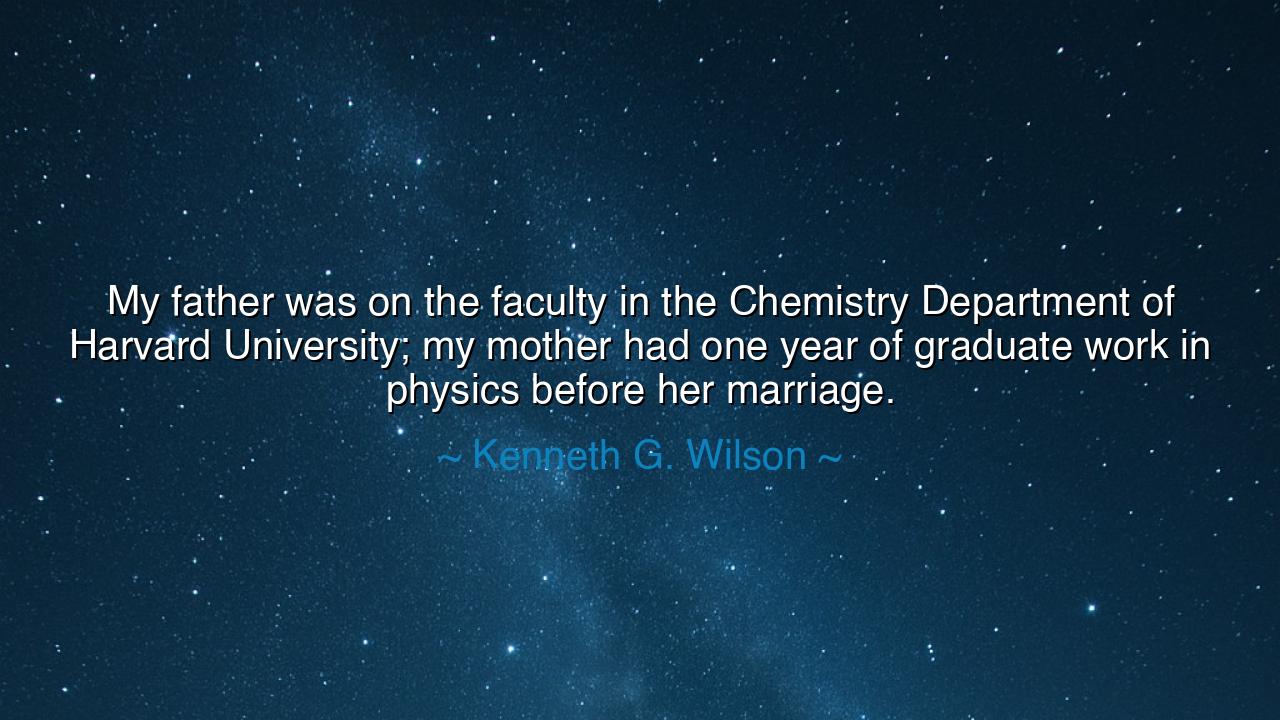
My father was on the faculty in the Chemistry Department of
My father was on the faculty in the Chemistry Department of Harvard University; my mother had one year of graduate work in physics before her marriage.






“My father was on the faculty in the Chemistry Department of Harvard University; my mother had one year of graduate work in physics before her marriage.” — Thus spoke Kenneth G. Wilson, the Nobel laureate whose mind probed the infinite depths of matter and the mysteries of the universe’s smallest laws. At first glance, his words seem but a recollection of family history, a humble note on his parents’ professions. Yet within this quiet statement lies a profound reflection on the roots of genius, the inheritance of curiosity, and the sacred duty of knowledge passed from one generation to the next. It is a testament to the power of intellectual lineage, where thought itself becomes a living flame, handed from parent to child.
In these few words, Wilson does not boast of privilege or pedigree. He reveals something more timeless — the way that environment shapes destiny. The child who grows up among books, experiments, and the restless questions of the mind is not merely learning facts, but absorbing a way of seeing the world. His father’s chemistry, his mother’s physics, were not merely subjects; they were languages of truth, whispering through the walls of their home. In that space of inquiry and wonder, the seed of discovery took root — a seed that would one day blossom into Wilson’s revolutionary theories on phase transitions and the renormalization group.
But look deeper still, and there is another truth. His mother’s path, marked by brilliance yet interrupted by marriage, reflects the story of countless women whose potential was dimmed not by lack of ability, but by the customs of their age. In her, we see the quiet heroism of intellect deferred — and yet, through her son, her passion endured. She became, in a sense, the unseen architect of his greatness. For though she laid aside her formal studies, the spirit of inquiry she carried did not die; it was passed down, like a torch hidden in her hands, until her child could lift it high once more.
History is filled with such hidden legacies. Think of Sofya Kovalevskaya, the 19th-century mathematician who, denied a university education because she was a woman, studied in secret under false names. Her struggle, like that of Wilson’s mother in quieter form, reminds us that intellect knows no gender — only opportunity limits its flowering. Every advance in science, every spark of innovation, stands upon the shoulders not only of those who were seen, but also of those whose genius went unrecognized. To speak of family in the context of knowledge is to speak of an unbroken chain, forged by both action and sacrifice.
Wilson’s words thus become more than biography; they are an invocation of heritage — not of wealth, but of wisdom. They tell us that greatness does not arise in isolation. The laboratory, the classroom, the home filled with questions — these are temples of learning where the young are shaped by the unseen forces of example. The elder teaches not through instruction alone, but through the devotion to truth they embody. And when that devotion is shared between father and mother, between chemistry and physics, between matter and meaning, then the child who grows among them learns not just what to know, but how to seek.
To those who hear this teaching, take heed: your environment is the soil from which your spirit grows. Surround yourself with curiosity, with minds that question, with hearts that love wisdom. If you are a parent, nurture inquiry in your children — not only by giving answers, but by showing the joy of not yet knowing. If you are a learner, honor those who came before you, whose quiet labors gave you the chance to dream. For every discovery is not one person’s triumph, but the culmination of a thousand unseen acts of courage and persistence.
Thus, let us read Kenneth G. Wilson’s words as both memory and message: that knowledge is not inherited by blood, but by example; that education is the noblest legacy one generation can offer the next. In the union of his father’s science and his mother’s intellect, the universe found a mind capable of unveiling its hidden harmonies. So too may we, by honoring both the thinkers and the dreamers before us, continue that sacred work — building a world where no spark of genius is lost, and every soul is free to wonder, to learn, and to create.






AAdministratorAdministrator
Welcome, honored guests. Please leave a comment, we will respond soon